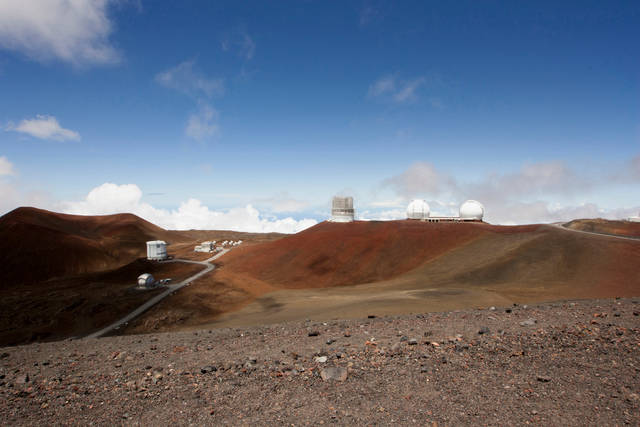HONOLULU — A key decision on where to place a $1.4 billion giant telescope has been delayed.
The board of governors for the Thirty Meter Telescope International Observatory is still considering whether to allow construction to go forward on the targeted site, Mauna Kea, a mountain in Hawaii. An alternative location in Spain’s Canary Islands remains under consideration, the board said in a statement Friday.
“We continue to assess the ongoing situation as we work toward a decision,” said Ed Stone, the executive director of the TMT International Observatory. Mauna Kea “remains our preferred choice.”
The board hasn’t provided a timeline for a decision as it plans to let legal and regulatory challenges play out on both sites.
Mauna Kea, a dormant volcano and Hawaii’s tallest mountain, was selected in July 2009 as the target location for the telescope after a five-year search. Scientists called it the best location in the world for astronomy, given a stable, dry, and cold, climate, which allows for sharp images. The atmosphere over the mountain also provides favorable conditions for astronomical measurements, according to the TMT website. But some have protested against the telescope over concerns of environmental impact. Mauna Kea, which is already the site of other telescopes, is considered sacred by some Native Hawaiians.
“Thirty years of astronomy development has resulted in adverse significant impact to the natural and cultural resources of Mauna Kea,” said Kealoha Pisciotta, president of Mauna Kea Anaina Hou, an indigenous, Native Hawaiian group that works on environmental issues. “Trying to build more would have added to the cumulative impact.”
On Thursday, the Hawaii Senate approved a bill to ban new construction atop Mauna Kea, and included a series of audits and other requirements before the ban could be lifted. But House and Senate versions of the bill differ, so the two chambers would need to negotiate the differences in a conference committee. House leaders say they don’t have plans to advance the bill. Democratic House Speaker Scott Saiki told the Honolulu Star-Advertiser that the “bill is dead on arrival in the House.” He said laws concerning the mountain should not be passed while litigation is pending.
There are also two appeals before the Hawaii Supreme Court.
The telescope project is a collaboration among universities in the U.S. and California, including the University of Hawaii, as well as national science and research institutes of Japan, China, and India.
“It’s a privilege to practice astronomy on Mauna Kea and we’re not satisfied with where we’re at right now,” Dan Meisenzahl, a spokesperson for the University of Hawaii, said in a statement. “We will continue to push ourselves to improve our stewardship of the mountain.”


